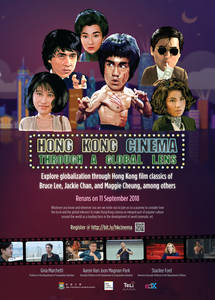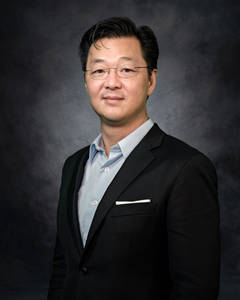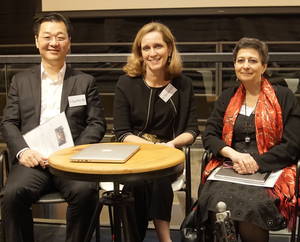CCGL9001: Hong Kong Cinema Through a Global Lens is a MOOC – a massive open online course. It originates from the University of Hong Kong by Professor Gina Marchetti, Dr. Aaron Han Joon Magnan-Park, and Dr. Stacilee Ford. The course endeavors to bring Hong Kong cinema into the spotlight through a variety of lectures, discussions, and a list of films to view during the course. The MOOC runs on a platform called EdX and the next offering of the course will begin in September. The course encourages its students to connect globally and learn more about the impact of Hong Kong cinema on world cinema. We interviewed Dr. Aaron Magnan-Park in summer 2018 to learn more about the course and what it entails.
Catherine Colson: Tell us about the Hong Kong Cinema Through a Global Lens MOOC.
Aaron Han Joon Magnan-Park: Our MOOC is the first half of a semester-long general education course by the same title under our Common Core curriculum. It addresses the Hong Kong films, genres, directors, and actors who make this cinema globally important as well as the lesser-known local films that connect more closely with the local population from a critical perspective. Given the global emphasis, we empower our students to create individual positions on how these Hong Kong films connect with larger forces at play ideologically, aesthetically, culturally, economically, and intellectually. These are then connected with issues of gender and cultural identity, critique, and analysis.
The MOOC consists of six lectures. Each lecture topic is based on our own individual research and publications so we can provide in-depth, comprehensive, and nuanced insights. Each lecture is designed to further discussion so that individual participants can form their own critical positions. Professor Gina Marchetti provides lectures on Jackie Chan and the new global kung fu craze, Andy Lau’s Infernal Affairs (2002) and Hong Kong’s disintegrating identity crisis, and Wong Kar Wai’s In the Mood for Love (2000) as a landmark art film of global proportions. Dr. Stacilee Ford gives a lecture on migration melodramas centered on a close reading of Mabel Cheung’s An Autumn’s Tale (1987). My lectures cover Bruce Lee and the first global kung fu craze and John Woo’s changing heroic bloodshed aesthetic rationale once he begins working in Hollywood by comparing The Killer (1989) with Face/Off (1997).
CC: Why a MOOC?
AHJMP: MOOC stands for Massive Open Online Course. It is designed to make available to the global learning community a regular course that is offered at the University of Hong Kong. So it is a form of public continuing education where we open up what we do on campus such that anyone in the world who would like to learn, explore, and benefit from our curriculum can have this opportunity. As a public university, we have a duty to educate the general public, not just those students who are admitted and have the chance to enroll in this course. When we run the Common Core course, CCGL9001, we can only enroll 120 students based on the size of the lecture auditorium. The MOOC allows us to reach a much larger learning community that is by design limitless.
CC: What kind of support did you receive from the University of Hong Kong?
AHJMP: When our university first decided to partake in the MOOC movement, Professor Marchetti submitted a course proposal and it was accepted. Our MOOC was one of five that our university chose for its first foray. So we received financial support from the university, teaching credit for the teaching team, support from our MOOC assistants, the production magic of our TELI (Technology-Enriched Learning Initiative) team, and the full backing of Professor Ricky Kwok, our Associate Vice-President of Teaching and Learning.
CC: How does the EdX platform help deliver your course?
AHJMP: We chose EdX because it was not based on a for-profit model. Anyone can enroll in our MOOC without paying for this experience. Those who would like to obtain a certificate of completion have the option to pay a small fee for this validation but it is not obligatory. EdX was also the best choice since they are a global enterprise with a full commitment to making adjustments to become viable in the mainland Chinese market. This ensures that our English-language lectures are accompanied by both English and simplified Chinese subtitles.
 CC: Is the course synchronous? And do you have established learning outcomes?
CC: Is the course synchronous? And do you have established learning outcomes?
AHJMP: The MOOC runs synchronously with the regular on-campus course. We intentionally do this so that our on-campus students can use the MOOC lectures as a supplementary learning aid. We also did this so that we can have our on-campus students engage with our online MOOC participants via the discussion forums. On Fridays, we shoot a short segment called the Friday Forum where we engage with some of the posted comments, bring in updated material given recent events related to the week’s lecture, and, as of the most recent run, give our on-campus students a chance to also be in front of the camera in an informal roundtable discussion. The Friday Forums are then edited in postproduction over the weekend, before going live on Tuesday, just prior to the start of the next lecture on Wednesday. For many of our students at the University of Hong Kong, English is their second language, so having the lectures on the MOOC for review is also a valuable second chance to master the material. The learning objectives are slightly modified for the MOOC, but not the quality of instruction, since the MOOC learning community can range from high school students up to retired people from all around the world.
CC: How do you think your students are watching the assigned films?
AHJMP: We consciously chose to pick films that were readily available via DVD or online. So, for example, when I give my lecture on Bruce Lee, I recommend Enter the Dragon (1973), but any of his kung fu films will be okay since the lecture encompasses Bruce Lee’s entire career. The one exception to this general rule is Mabel Cheung’s An Autumn’s Tale (1987), which did not enjoy a global DVD release. We did this because it is an important film that addresses the Hong Kong Chinese diasporic experience in the United States and Dr. Stacilee Ford is a leading authority on this film. Director Cheung is also an alumna of our university so it made sense on many levels to include it in our course and MOOC.
CC: How do you foster interaction on a local/global scale between your students? What do you hope to accomplish with this interaction?
AHJMP: The discussion forums that come at the end of each MOOC lecture are the primary venues for interactions between our on-campus students and our online MOOC participants. Gina, Staci, and I also engage with the comments by posting our own statements. The hope is that these two communities will share, engage, and offer insights to each other so that both groups will be enriched by this intellectual engagement.
CC: What do you want the key takeaways to be for your students–regarding both Hong Kong cinema and the goal of creating a more global learning environment?
AHJMP: The goal of a university education is to create globally minded, engaged, and informed individuals who see the entire planet as their home. While not every student has the means or the opportunity to travel overseas, the classroom experience should still allow the benefits of travel to happen locally so that when a future opportunity arises, our students will be in the right mind frame to blossom because of that opportunity.
CC: What can you tell us about the people who take your MOOC?
AHJMP: The demographic data are very encouraging. It is a global learning community ranging from high school students as well as people beyond college age. Students, teachers, film industry personnel, people who have already earned their bachelor’s degrees, and retired people have taken our MOOC. The participants also represent an equal split in gender. There is a particular nostalgic population who grew up with these films or who want to reconnect with their memories of Hong Kong.
We are especially pleased that a number of our university colleagues around the world have completed our MOOC. They are also exploring what, how, and why MOOCs help us become globally engaged public scholars.
CC: Do you have any demographic data regarding your MOOC participants?
AHJMP: Yes, we do. EdX provides us with a rundown of our MOOC demographic. I can share with you the following data points:
- The top four geographical locations are Hong Kong, America, China, and Great Britain.
- We have participants from every continent and nearly every country.
- The median age is 31 years old with a good 45 percent in the 26-40-year-old age range.
- 19 percent hold a high school diploma or below, 42 percent earned a college degree, and 36 percent obtained advanced degrees.
- Gender wise, it is evenly split.
CC: You encourage not only students but also academics to use this course–how might other academics benefit from the experience?
AHJMP: Academics have to specialize but we are often asked to teach material that is a bit outside our comfort zones. We also at times do not have the right resources or support to do what we aspire to do. We created our MOOC to aid our colleagues so that, should they teach a course on Hong Kong cinema or one of our weekly lecture topics, they can use our MOOC material as a supplemental teaching aid to empower themselves to do that which was previously impossible to do. Since our university runs along an academic calendar that is similar to North America and Europe, we hope that any academic who finds our MOOC beneficial will use our MOOC to enhance the courses that they teach.
Academic colleagues who would like to use our MOOC in part of in full during fall 2018 should contact us via email as early as possible so that we can officially acknowledge their participation and also set up special discussion forum opportunities that link their students with our own as well as the larger MOOC learning community.
Our email addresses are:
- Professor Gina Marchetti (marchett AT hku.hk)
- Dr. Aaron Han Joon Magnan-Park (ahjmp AT hku.hk)
- Dr. Stacilee Ford (sford AT hku.hk)
CC: Are there any universities who have already agreed to utilize the MOOC during the 2018-19 academic year?
AHJMP: Yes. We are excited by two firm commitments at this time. Professor Frances Gateward from California State University Northridge will participate during the week when Mabel Cheung’s An Autumn’s Tale is addressed. Also, Professor George Wang from the University of Hawaii at Manoa will join us during the week when John Woo’s career in Hong Kong and Hollywood is presented.
CC: How many times have you offered this course now? Have you learned something new each time?
AHJMP: We have run this MOOC now for a total of three consecutive iterations that started in spring 2017. A fourth run is scheduled to launch on September 11, 2018. We had a chance to tweak our lectures after the first run as well as the assessment exercises. Each run of the MOOC engages with a different set of participants so it is natural that we are always learning something new each time we run the MOOC. You can see some of these new insights in the archived forum discussion postings as well as the Friday Forums.
CC: How many additional offerings of the MOOC will there be in the future?
AHJMP: Over the summer, we received the good news that we will be funded for two additional runs. This means that along with fall 2018, we will also be offering our MOOC during spring 2019 and fall 2019. This will allow more opportunities for our colleagues to utilize our MOOC for their own pedagogical purposes.
CC: What has student feedback been like?
AHJMP: It has been largely positive and encouraging. Even those participants who thought they knew everything about a particular subject expressed surprise at learning something new.
CC: What has been the most rewarding part of running this course so far?
AHJMP: We’ve been delighted by the richness of the intellectual curiosity, engagement, and insights that have been shared by the participants as well as how the MOOC has granted us avenues of pedagogical innovation that would not have been possible without this new educational platform.
CC: Is the MOOC making an impact within Hong Kong?
AHJMP: The Hong Kong government’s University Grants Committee asked us to allow students enrolled in our peer institutions such as the Chinese University of Hong Kong, the Hong Kong University of Science and Technology, the Hong Kong Polytech University, Hong Kong Baptist University, and Lingnan University to officially be granted places in our regular on-campus course, CCGL9001: Hong Kong Cinema Through a Global Lens, because the parallel MOOC component provides a new pedagogical approach to the traditional university lecture format. This new initiative is called “Responsive 4U: Cross-Institutional Course Sharing Project.” The official website is: https://responsive4u.org. This is a very new initiative and we are all excited to implement this idea for all undergraduates who are drawn to our course.
CC: As you mentioned, your next class starts on September 11, 2018–who will be teaching it this time around?
AHJMP: From the very start, the MOOC has been committed to being a team-taught course by Professor Gina Marchetti, Dr. Stacilee Ford, and me. The MOOC is successful because of our individual contributions since we present material that is central to our individual research strengths and concerns.
CC: For those who are interested in your course, how should they enroll and by when?
AHJPM: About one month prior to the start of the MOOC, EdX will begin advertising it on their website and, if you have an EdX account, via email notifications. Enrolment can happen any time before and during the MOOC but not after it is over.
CC: Do you have any new MOOCs planned for the future?
AHJMP: We originally conceived our MOOC to replicate in full our semester-long on-campus course. We even completed the filming of a second set of six lectures as well as most of the postproduction work. However, we do not yet have the green light to complete and launch the second half.
There is always the possibility of a new MOOC. The question is always one of finding the financial underwriting and technical support to bring it to life. How wonderful it would be if all of our film courses could have a MOOC equivalent.
CC: Finally, what can Hong Kong cinema teach us about the world?
AHJMP: Hong Kong is a very small place but it nevertheless makes a massive impact in the advancement of global cinema as well as serving as a focused locus for the tremendous transformations that we are experiencing planetwide in our everyday lives. Many of the key Hollywood blockbuster films are more globally successful at the box office because of Hong Kong’s participation in the filmmaking process as well as serving as a recognizable location for on-site filming as a cinematic city. We hope that our MOOC provides a gateway to open people’s eyes to this reality.
Author Biography
Catherine Traci Colson is a senior at the University of North Carolina Wilmington Film Studies program. She enjoys the editing side of film production, and aims to become a professional editor.









































